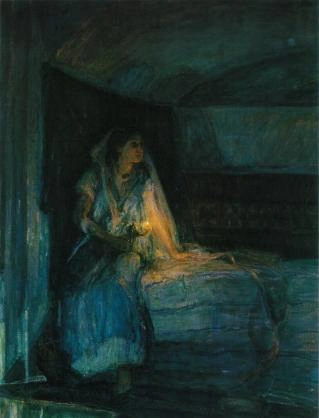1
ο-
A--NSM δε-X οφις-N3I-NSM ειμι-V9--IAI3S φρονιμος-A1B-NSMS πας-A3--GPN ο-
A--GPN θηριον-N2N-GPN ο-
A--GPN επι-P ο-
A--GSF γη-N1--GSF ος-
--GPN ποιεω-VAI-AAI3S κυριος-N2--NSM ο-
A--NSM θεος-N2--NSM και-C ειπον-VBI-AAI3S ο-
A--NSM οφις-N3I-NSM ο-
A--DSF γυνη-N3K-DSF τις-
I--ASN οτι-C ειπον-VBI-AAI3S ο-
A--NSM θεος-N2--NSM ου-D μη-D εσθιω-VB--AAS2P απο-P πας-A3--GSN ξυλον-N2N-GSN ο-
A--GSN εν-P ο-
A--DSM παραδεισος-N2--DSM
2
και-C ειπον-VBI-AAI3S ο-
A--NSF γυνη-N3K-NSF ο-
A--DSM οφις-N3I-DSM απο-P καρπος-N2--GSM ξυλον-N2N-GSN ο-
A--GSM παραδεισος-N2--GSM εσθιω-VF--FMI1P
3
απο-P δε-X καρπος-N2--GSM ο-
A--GSN ξυλον-N2N-GSN ος-
--NSN ειμι-V9--PAI3S εν-P μεσος-A1--DSM ο-
A--GSM παραδεισος-N2--GSM ειπον-VBI-AAI3S ο-
A--NSM θεος-N2--NSM ου-D εσθιω-VF--FMI2P απο-P αυτος-
D--GSM ουδε-C μη-D απτομαι-VA--AMS2P αυτος-
D--GSM ινα-C μη-D αποθνησκω-VB--AAS2P
4
και-C ειπον-VBI-AAI3S ο-
A--NSM οφις-N3I-NSM ο-
A--DSF γυνη-N3K-DSF ου-D θανατος-N2--DSM αποθνησκω-VF2-FMI2P
5
οιδα-VXI-YAI3S γαρ-X ο-
A--NSM θεος-N2--NSM οτι-C εν-P ος-
--DSF αν-X ημερα-N1A-DSF εσθιω-VB--AAS2P απο-P αυτος-
D--GSM δια αναοιγω-VQ--FPI3P συ-
P--GP ο-
A--NPM οφθαλμος-N2--NPM και-C ειμι-VF--FMI2P ως-C θεος-N2--NPM γιγνωσκω-V1--PAPNPM καλος-A1--ASN και-C πονηρος-A1A-ASN
6
και-C οραω-VBI-AAI3S ο-
A--NSF γυνη-N3K-NSF οτι-C καλος-A1--NSN ο-
A--NSN ξυλον-N2N-NSN εις-P βρωσις-N3I-ASF και-C οτι-C αρεστος-A1--NSN ο-
A--DPM οφθαλμος-N2--DPM οραω-VB--AAN και-C ωραιος-A1A-NSN ειμι-V9--PAI3S ο-
A--GSN κατανοεω-VA--AAN και-C λαμβανω-VB--AAPNSF ο-
A--GSM καρπος-N2--GSM αυτος-
D--GSN εσθιω-VBI-AAI3S και-C διδωμι-VAI-AAI3S και-C ο-
A--DSM ανηρ-N3--DSM αυτος-
D--GSF μετα-P αυτος-
D--GSF και-C εσθιω-VBI-AAI3P
7
και-C δια αναοιγω-VQI-API3P ο-
A--NPM οφθαλμος-N2--NPM ο-
A--GPM δυο-M και-C γιγνωσκω-VZI-AAI3P οτι-C γυμνος-A1--NPM ειμι-V9--IAI3P και-C ραπτω-VAI-AAI3P φυλλον-N2N-APN συκη-N1--GSF και-C ποιεω-VAI-AAI3P εαυτου-
D--DPM περιζωμα-N3W-APN
8
και-C ακουω-VAI-AAI3P ο-
A--ASF φωνη-N1--ASF κυριος-N2--GSM ο-
A--GSM θεος-N2--GSM περιπατεω-V2--PAPGSM εν-P ο-
A--DSM παραδεισος-N2--DSM ο-
A--ASN δειλινος-A1--ASN και-C κρυπτω-VZI-AAI3P ος-
--NSN τε-X *αδαμ-N---NSM και-C ο-
A--NSF γυνη-N3K-NSF αυτος-
D--GSM απο-P προσωπον-N2N-GSN κυριος-N2--GSM ο-
A--GSM θεος-N2--GSM εν-P μεσος-A1--DSM ο-
A--GSN ξυλον-N2N-GSN ο-
A--GSM παραδεισος-N2--GSM
9
και-C καλεω-VAI-AAI3S κυριος-N2--NSM ο-
A--NSM θεος-N2--NSM ο-
A--ASM *αδαμ-N---ASM και-C ειπον-VBI-AAI3S αυτος-
D--DSM *αδαμ-N---VSM που-D ειμι-V9--PAI2S
10
και-C ειπον-VBI-AAI3S αυτος-
D--DSM ο-
A--ASF φωνη-N1--ASF συ-
P--GS ακουω-VAI-AAI1S περιπατεω-V2--PAPGSM εν-P ο-
A--DSM παραδεισος-N2--DSM και-C φοβεω-VCI-API1S οτι-C γυμνος-A1--NSM ειμι-V9--PAI1S και-C κρυπτω-VDI-API1S
11
και-C ειπον-VBI-AAI3S αυτος-
D--DSM τις-
I--NSM ανααγγελλω-VAI-AAI3S συ-
P--DS οτι-C γυμνος-A1--NSM ειμι-V9--PAI2S μη-D απο-P ο-
A--GSN ξυλον-N2N-GSN ος-
--GSN εντελλομαι-VAI-AMI1S συ-
P--DS ουτος-
D--GSM μονος-A1--GSM μη-D εσθιω-VB--AAN απο-P αυτος-
D--GSN εσθιω-VBI-AAI2S
12
και-C ειπον-VBI-AAI3S ο-
A--NSM *αδαμ-N---NSM ο-
A--NSF γυνη-N3K-NSF ος-
--ASF διδωμι-VAI-AAI2S μετα-P εγω-
P--GS ουτος-
D--NSF εγω-
P--DS διδωμι-VAI-AAI3S απο-P ο-
A--GSN ξυλον-N2N-GSN και-C εσθιω-VBI-AAI3P
13
και-C ειπον-VBI-AAI3S κυριος-N2--NSM ο-
A--NSM θεος-N2--NSM ο-
A--DSF γυνη-N3K-DSF τις-
I--ASN ουτος-
D--ASN ποιεω-VAI-AAI2S και-C ειπον-VBI-AAI3S ο-
A--NSF γυνη-N3K-NSF ο-
A--NSM οφις-N3I-NSM απαταω-VAI-AAI3S εγω-
P--AS και-C εσθιω-VBI-AAI3P
14
και-C ειπον-VBI-AAI3S κυριος-N2--NSM ο-
A--NSM θεος-N2--NSM ο-
A--DSM οφις-N3I-DSM οτι-C ποιεω-VAI-AAI2S ουτος-
D--ASN επικαταρατος-A1B-NSM συ-
P--NS απο-P πας-A3--GPN ο-
A--GPN κτηνος-N3E-GPN και-C απο-P πας-A3--GPN ο-
A--GPN θηριον-N2N-GPN ο-
A--GSF γη-N1--GSF επι-P ο-
A--DSN στηθος-N3E-DSN συ-
P--GS και-C ο-
A--DSF κοιλια-N1A-DSF πορευομαι-VF--FMI2S και-C γη-N1--ASF εσθιω-VF--FMI2S πας-A1S-APF ο-
A--APF ημερα-N1A-APF ο-
A--GSF ζωη-N1--GSF συ-
P--GS
15
και-C εχρα-N1A-ASF τιθημι-VF--FAI1S ανα-P μεσος-A1--ASN συ-
P--GS και-C ανα-P μεσος-A1--ASM ο-
A--GSF γυνη-N3K-GSF και-C ανα-P μεσος-A1--ASM ο-
A--GSN σπερμα-N3M-GSN συ-
P--GS και-C ανα-P μεσος-A1--ASM ο-
A--GSN σπερμα-N3M-GSN αυτος-
D--GSF αυτος-
D--NSM συ-
P--GS τηρεω-VF--FAI3S κεφαλη-N1--ASF και-C συ-
P--NS τηρεω-VF--FAI2S αυτος-
D--GSM πτερνα-N1S-ASF
16
και-C ο-
A--DSF γυνη-N3K-DSF ειπον-VBI-AAI3S πληθυνω-V1--PAPNSM πληθυνω-VF2-FAI1S ο-
A--APF λυπη-N1--APF συ-
P--GS και-C ο-
A--ASM στεναγμος-N2--ASM συ-
P--GS εν-P λυπη-N1--DPF τικτω-VF--FMI2S τεκνον-N2N-APN και-C προς-P ο-
A--ASM ανηρ-N3--ASM συ-
P--GS ο-
A--NSF αποστροφη-N1--NSF συ-
P--GS και-C αυτος-
D--NSM συ-
P--GS κυριευω-VF--FAI3S
17
ο-
A--DSM δε-X *αδαμ-N---DSM ειπον-VBI-AAI3S οτι-C ακουω-VAI-AAI2S ο-
A--GSF φωνη-N1--GSF ο-
A--GSF γυνη-N3K-GSF συ-
P--GS και-C εσθιω-VBI-AAI2S απο-P ο-
A--GSN ξυλον-N2N-GSN ος-
--GSN εντελλομαι-VAI-AMI1S συ-
P--DS ουτος-
D--GSM μονος-A1--GSM μη-D εσθιω-VB--AAN απο-P αυτος-
D--GSN επικαταρατος-A1B-NSM ο-
A--NSF γη-N1--NSF εν-P ο-
A--DPN εργον-N2N-DPN συ-
P--GS εν-P λυπη-N1--DPF εσθιω-VF--FMI2S αυτος-
D--ASF πας-A1S-APF ο-
A--APF ημερα-N1A-APF ο-
A--GSF ζωη-N1--GSF συ-
P--GS
18
ακανθα-N1A-APF και-C τριβολος-N2--APM ανατελλω-VF2-FAI3S συ-
P--DS και-C εσθιω-VF--FMI2S ο-
A--ASM χορτος-N2--ASM ο-
A--GSM αγρος-N2--GSM
19
εν-P ιδρως-N3T-DSM ο-
A--GSN προσωπον-N2N-GSN συ-
P--GS εσθιω-VF--FMI2S ο-
A--ASM αρτος-N2--ASM συ-
P--GS εως-P ο-
A--GSN αποστρεφω-VA--AAN συ-
P--AS εις-P ο-
A--ASF γη-N1--ASF εκ-P ος-
--GSF λαμβανω-VVI-API2S οτι-C γη-N1--NSF ειμι-V9--PAI2S και-C εις-P γη-N1--ASF αποερχομαι-VF--FMI2S
20
και-C καλεω-VAI-AAI3S *αδαμ-N---NSM ο-
A--ASN ονομα-N3M-ASN ο-
A--GSF γυνη-N3K-GSF αυτος-
D--GSM *ζωη-N1--NSF οτι-C ουτος-
D--NSF μητηρ-N3--NSF πας-A3--GPM ο-
A--GPM ζαω-V3--PAPGPM
21
και-C ποιεω-VAI-AAI3S κυριος-N2--NSM ο-
A--NSM θεος-N2--NSM ο-
A--DSM *αδαμ-N---DSM και-C ο-
A--DSF γυνη-N3K-DSF αυτος-
D--GSM χιτων-N3W-APM δερματινος-A1--APM και-C ενδυω-VAI-AAI3S αυτος-
D--APM
22
και-C ειπον-VBI-AAI3S ο-
A--NSM θεος-N2--NSM ιδου-I *αδαμ-N---NSM γιγνομαι-VX--XAI3S ως-C εις-A3--NSM εκ-P εγω-
P--GP ο-
A--GSN γιγνωσκω-V1--PAN καλος-A1--ASM και-C πονηρος-A1A-ASM και-C νυν-D μηποτε-D εκτεινω-VA--AAS3S ο-
A--ASF χειρ-N3--ASF και-C λαμβανω-VB--AAS3S ο-
A--GSN ξυλον-N2N-GSN ο-
A--GSF ζωη-N1--GSF και-C εσθιω-VF--FMI2S και-C ζαω-VF--FMI3S εις-P ο-
A--ASM αιων-N3W-ASM
23
και-C εκ αποστελλω-VAI-AAI3S αυτος-
D--ASM κυριος-N2--NSM ο-
A--NSM θεος-N2--NSM εκ-P ο-
A--GSM παραδεισος-N2--GSM ο-
A--GSF τρυφη-N1--GSF εργαζομαι-V1--PMN ο-
A--ASF γη-N1--ASF εκ-P ος-
--GSF λαμβανω-VVI-API3S
24
και-C εκβαλλω-VBI-AAI3S ο-
A--ASM *αδαμ-N---ASM και-C καταοικιζω-VAI-AAI3S αυτος-
D--ASM απεναντι-P ο-
A--GSM παραδεισος-N2--GSM ο-
A--GSF τρυφη-N1--GSF και-C τασσω-VAI-AAI3S ο-
A--APN χερουβιμ-N---APN και-C ο-
A--ASF φλογινος-A1--ASF ρομφαια-N1A-ASF ο-
A--ASF στρεφω-V1--PMPASF φυλασσω-V1--PAN ο-
A--ASF οδος-N2--ASF ο-
A--GSN ξυλον-N2N-GSN ο-
A--GSF ζωη-N1--GSF







